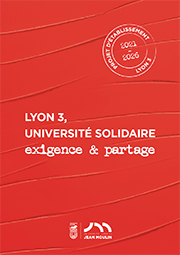AccueilRechercheProgrammes et productions scientifiquesThèsesThèses soutenuesThèses soutenues - 2006-2021Thèses soutenues - 2017
-
Partager cette page
- Recherche,
ATTINDEHOU Olivier Charles
Penser l’instabilité socio-politique en Afrique subsaharienne. Examen des causes et revendication heuristique : la stabilité par le chaos. Les cas illustratifs de la C?te d’Ivoire et du Rwanda
Publié le 2 février 2018 – Mis à jour le 13 décembre 2018
Thèse en Science politique, soutenue le 30 octobre 2017.
L’Afrique subsaharienne se présente, involontairement, comme une région en proie à une succession de crises, de conflits, de guerres civiles. Ces externalités négatives de l’instabilité socio-politique s’appréhendent, souvent, par le truchement du rite jaculatoire causal. D’où, les vocables ? ethnies ?, ? identité ? – lorsqu’il n’est pas question de sous-développement, ou de l’injection du déficit démocratique –, auprès des commentateurs, sont, de fa?on cursive, convoqués pour expliquer le désordre per?u. Ainsi, les événements de 1994 au Rwanda sont ramenés à un conflit – ? ethnique ? – Hutu/Tutsi; négligeant par voie de conséquence l’acuité de la complexité de la réalité, ou à défaut, celle de la convergence de variables. Et pourtant, en descendant dans cette profondeur cognitive, tout observateur constaterait que l’instabilité socio-politique en Afrique subsaharienne reste une construction dans le temps et dans l’espace, optimisée par l’impénitent désir de pouvoir des acteurs politiques. Les structures historiques, loin d’être de véritables déterminants, participent à la construction sociale de la réalité porteuse d’idées, de règles et de pratiques représentationnelles qui érigent la nécessaire grammaire du bouleversement social. Nos présents travaux, non seulement, viennent examiner les causes habituellement avancées, mais s’opposent également aux arguments culturalistes mobilisés pour l’explication ou la compréhension de l’instabilité socio-politique
en Afrique subsaharienne. C’est pourquoi, nous retenons que la justesse scientifique afférente à la compréhension du mouvement mécanistique socio-politique en Afrique subsaharienne est fonction du mode de connaissance de la réalité per?ue. Par conséquent, nous estimons que l’instabilité socio-politique en Afrique subsaharienne, est un processus dynamique évolutif qui, nonobstant le désordre structurel, tend vers une stationnarité relative, puis absolue avant l’avènement de la stabilité.
Subsaharan Africa presents itself, involuntarily, like an area in the grip of a succession of crises, conflicts, civil wars. These negative externalities of sociopolitical instability are apprehended, often, by the means of the causal ritual. That's why, the terms "ethnic group", "identity" - when it isn't question of underdevelopment, or the injection of democratic deficit - near the commentators, in a cursory mention, are convened to explain the perceived disorder.
Thus, the events of 1994 in Rwanda are brought back to a "ethnic" conflict Hutu/Tutsi;
negleging consequently the acuity of the complexity of reality or failing this, that of the
convergence of variables. And yet, while going down in this cognitive depth, any observer would note that sociopolitical instability in subsaharan Africa remains a construction in time and space, optimized by the unrepentant desire of power of the political actors. The historical structures, far from being true determinants, take part in the social construction of reality carrying ideas, rules, and practices representational which set up the necessary grammar of the social upheaval. Our present work, not only comes to examine the usually advanced causes, but is also opposed to the culturalist arguments mobilized for the explanation or the comprehension of sociopolitical instability in subsaharan Africa. This is why, we retain that the scientific accuracy related with the comprehension of sociopolitical mechanisitc movement in subsaharan Africa is function of the mode of knowledge of perceived reality.
Consequently, we estimate that sociopolitical instability in subsaharan Africa, is an
evolutionary dynamic process which, notwhithstanding, the strutural disorder, strives for a relative stationnarity, then absolute before the advent of stability.
Directeur(s).trice(s) de thèse : M. Jean-Paul JOUBERT
en Afrique subsaharienne. C’est pourquoi, nous retenons que la justesse scientifique afférente à la compréhension du mouvement mécanistique socio-politique en Afrique subsaharienne est fonction du mode de connaissance de la réalité per?ue. Par conséquent, nous estimons que l’instabilité socio-politique en Afrique subsaharienne, est un processus dynamique évolutif qui, nonobstant le désordre structurel, tend vers une stationnarité relative, puis absolue avant l’avènement de la stabilité.
Subsaharan Africa presents itself, involuntarily, like an area in the grip of a succession of crises, conflicts, civil wars. These negative externalities of sociopolitical instability are apprehended, often, by the means of the causal ritual. That's why, the terms "ethnic group", "identity" - when it isn't question of underdevelopment, or the injection of democratic deficit - near the commentators, in a cursory mention, are convened to explain the perceived disorder.
Thus, the events of 1994 in Rwanda are brought back to a "ethnic" conflict Hutu/Tutsi;
negleging consequently the acuity of the complexity of reality or failing this, that of the
convergence of variables. And yet, while going down in this cognitive depth, any observer would note that sociopolitical instability in subsaharan Africa remains a construction in time and space, optimized by the unrepentant desire of power of the political actors. The historical structures, far from being true determinants, take part in the social construction of reality carrying ideas, rules, and practices representational which set up the necessary grammar of the social upheaval. Our present work, not only comes to examine the usually advanced causes, but is also opposed to the culturalist arguments mobilized for the explanation or the comprehension of sociopolitical instability in subsaharan Africa. This is why, we retain that the scientific accuracy related with the comprehension of sociopolitical mechanisitc movement in subsaharan Africa is function of the mode of knowledge of perceived reality.
Consequently, we estimate that sociopolitical instability in subsaharan Africa, is an
evolutionary dynamic process which, notwhithstanding, the strutural disorder, strives for a relative stationnarity, then absolute before the advent of stability.
Mots-clés : Instabilité socio-politique ; Afrique subsaharienne ; Construction de la
réalité sociale ; C?te d’Ivoire ; Rwanda ; ?tat ; Théories morphologiques ; Ordre/désordre ; Culture et violence ; Complexité ; Scientificité ; ?pistémologie
réalité sociale ; C?te d’Ivoire ; Rwanda ; ?tat ; Théories morphologiques ; Ordre/désordre ; Culture et violence ; Complexité ; Scientificité ; ?pistémologie
Keywords :Sociopolitical instability; Subsaharan Africa; Construction of social reality; Ivory Coast; Rwanda; State; Morphological theories; Order/disorder; Culture and violence; Complexity; Scientific nature; Epistemology
Directeur(s).trice(s) de thèse : M. Jean-Paul JOUBERT
Membres du jury :
M. Christian BOUQUET, Professeur des universités émérite, Université Bordeaux-Montaigne,
M. Jean-Paul JOUBERT, Professeur des universités émérite, Université Jean Moulin Lyon 3,
M. Michel-Louis MARTIN, Rapporteur, Professeur des universités émérite, Université Toulouse 1 Capitole,
M. Joseph-Vincent NTUDA EBODE, Rapporteur, Professeur des universités, Université de Yaoundé 2,
Mme Caroline PATSIAS, Professeure, Université de Québec, Montréal (Canada).
Président.e du jury : Mme Caroline PATSIAS
Equipe d'accueil : Francophonie
M. Jean-Paul JOUBERT, Professeur des universités émérite, Université Jean Moulin Lyon 3,
M. Michel-Louis MARTIN, Rapporteur, Professeur des universités émérite, Université Toulouse 1 Capitole,
M. Joseph-Vincent NTUDA EBODE, Rapporteur, Professeur des universités, Université de Yaoundé 2,
Mme Caroline PATSIAS, Professeure, Université de Québec, Montréal (Canada).
Président.e du jury : Mme Caroline PATSIAS
Equipe d'accueil : Francophonie
Décision : Admis
Documentation
Mise à jour : 13 décembre 2018







